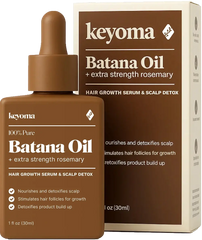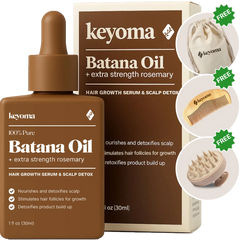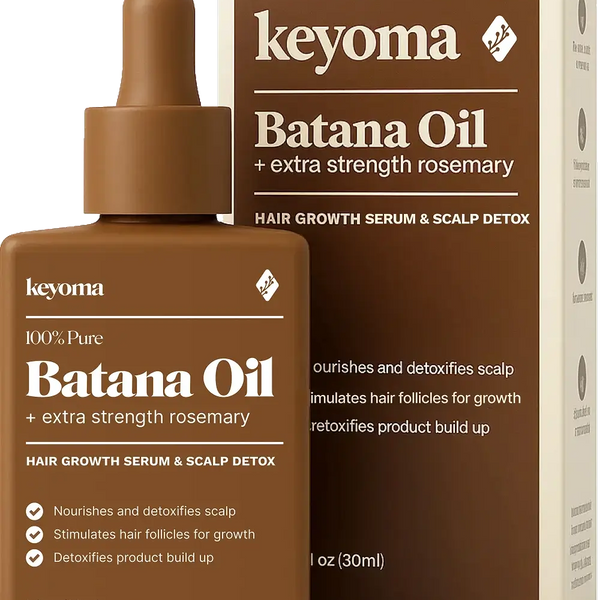Key Takeaways:
- Mind Your Senses: Rancid smell, gritty texture, or discolored appearance are clear signs your batana oil has spoiled.
- Store Smart: Keep batana oil in a cool, dark, and airtight container to prevent premature oxidation and extend its shelf life.
- Prioritize Freshness: While slightly aged oil may not be harmful, fresh batana oil delivers maximum efficacy for hair and scalp benefits.
When you invest in clean, high-performing hair care like Keyoma’s batana oil blend, you expect every drop to nourish, strengthen, and support healthy growth. But like all natural, preservative-free products, batana oil has a shelf life, and storing it improperly can shorten its effectiveness without you even realizing it.
If your oil’s scent seems a little off or its texture feels different than usual, you might be wondering if it’s still safe to use. That’s a valid concern, especially if you’re using it daily to support regrowth or manage thinning hair.
In this post, we’ll discuss the clear signs that your batana oil may have gone bad, how long it typically lasts, and what steps you can take if your product has expired. With the right information, you can protect your hair care routine and your results.
Understanding Batana Oil Shelf Life
When it comes to natural haircare, knowing how long your ingredients last is key to getting the most out of your routine. Batana oil, prized for its nourishing and restorative properties, is no exception. Its shelf life is influenced by how it's processed, stored, and used—factors that anyone seeking healthy hair naturally should be aware of.
What Is The Typical Shelf Life Of Batana Oil?
Pure, unrefined Batana oil typically has a shelf life of 12 to 24 months. This range can vary depending on exposure to heat, air, and light, all of which can accelerate the breakdown of natural compounds.
How Can You Maximize Shelf Life?
To keep Batana oil potent and fresh for as long as possible, store it in a cool, dark place, ideally in an airtight container. Avoid letting air or moisture get into the bottle, as this can hasten spoilage. Always use clean hands or utensils when dispensing the oil to prevent contamination.
What Causes Batana Oil To Go Bad?
As a natural, plant-based oil, Batana can oxidize over time. Common triggers for oxidation include exposure to sunlight, temperature fluctuations, and frequent bottle opening. Once the oil starts to break down, it can lose its rich texture, aroma, and, most importantly, effectiveness.
What Causes Batana Oil To Expire Prematurely?
Natural oils like Batana are cherished for their purity and potency, but even the finest formulas can spoil if exposed to the wrong conditions. Understanding what accelerates the breakdown of Batana oil ensures you get the most out of its shelf life and maximize the benefits for your hair and scalp.
Exposure To Light
Direct sunlight and even strong indoor lighting can destabilize the nutrients in Batana oil. UV rays break down fatty acids and antioxidants, causing the oil to lose its effectiveness and develop an off odor or color. Always store Batana oil in a dark, cool place to prevent premature spoilage.
Air And Oxidation
Contact with air is a primary culprit in oil degradation. When Batana oil interacts with oxygen, it oxidizes, which leads to rancidity and a decline in its hair-nourishing properties. Always close the lid tightly after each use and avoid leaving the bottle open.
Heat Fluctuations
Extreme temperatures, especially heat, can alter the chemical structure of Batana oil, causing it to separate or thicken unnaturally. Consistent, cool storage ensures the oil remains stable and shelf life is preserved.
Contamination
Introducing bacteria or water into the bottle, from fingers, droppers, or unclean surfaces—can lead to spoilage. Always use clean, dry hands or tools when dispensing Batana oil to prevent unwanted contamination and preserve its natural purity.
The Signs Of Expired Batana Oil: Smell, Texture, And Color
While batana oil boasts an impressive shelf life due to its natural antioxidants and careful artisanal production, it’s still susceptible to changes over time. Recognizing when your batana oil has gone bad will help you maximize its hair-nourishing benefits and avoid unwanted results. The key indicators are smell, texture, and color.
Smell
Fresh, high-quality batana oil typically has a gentle, earthy aroma with subtle nutty or roasted undertones. If your oil begins to emit a strong, sour, or rancid smell, this is a clear sign it has oxidized or spoiled. Changes in scent are the earliest and most noticeable sign of expiration.
Texture
Pure batana oil should feel smooth and silky while remaining viscous, especially when warmed between your palms. If you notice the oil has become excessively sticky, gritty, separated, or unusually thick, these are signs it may no longer be suitable for use.
Color
Batana oil in its prime usually ranges from golden to deep amber. Any significant fading, cloudy appearance, or unusual darkening, sometimes accompanied by sediment at the bottom, may indicate the oil is past its best.
How Storage Conditions Impact Freshness And Potency
Nature’s finest oils deserve careful handling. The way you store batana oil plays a crucial role in preserving its shelf life, keeping its unique nutrients intact, and ensuring it remains effective for your hair and scalp.
The Dangers Of Heat And Sunlight
Exposure to high temperatures and direct sunlight can speed up the breakdown of batana oil’s essential fatty acids and antioxidants. Over time, this can diminish the oil’s nourishing benefits and lead to rancidity. Always keep your batana oil in a cool, shaded spot away from windows and heating sources.
The Importance Of Sealing And Cleanliness
Leaving bottles uncapped allows air and moisture in, which can invite contaminants and trigger oxidation. Always tighten the cap securely after each use and avoid dipping fingers directly into the oil to maintain purity and extend the oil’s shelf life.
Humidity And Moisture Exposure
Bathrooms and humid environments increase the risk of water interacting with the oil, which can compromise its freshness and structure. Store your batana oil in a dry area to safeguard its potency and efficacy.
Can You Still Use Slightly Old Batana Oil?
When you notice that your batana oil is past the date you expected it to be at its freshest, it’s natural to wonder if you should keep using it or if it’s time for a replacement. Here’s what you need to know to make the safest, most effective choice for your hair and scalp health.
Is Slight Oxidation Harmful?
Mildly aged batana oil might experience slight oxidation, appearing a shade darker or producing a subtle change in aroma. This isn’t necessarily dangerous, as oxidation is a common process in natural oils exposed to air and light. While some of the beneficial fatty acids and antioxidants may lose potency, the oil typically remains safe to use if it still smells nutty and earthy—without rancid or sour notes. However, you may notice diminished results compared to fresh, vibrant oil.
Will My Scalp Or Hair React?
Most people with healthy hair and skin won’t experience irritation from slightly old batana oil. But it's best to err on the side of caution for those with sensitive scalps or conditions like eczema or dermatitis. Old oil’s altered chemistry might lead to minor discomfort or clog pores, especially if used heavily or left on the scalp for extended periods. Always do a patch test before applying older oil to large areas.
How About Its Effectiveness?
As batana oil ages, its natural properties gradually decline. The essential nutrients, think fatty acids and antioxidants, may not provide the robust hydration, scalp nourishment, or hair strengthening that fresh oil delivers. For those seeking maximum thickness, shine, and growth support, fresher is always better. Still, slightly old oil can be repurposed for softer uses, such as on beard hair or as a gentle hand moisturizer.
Extending Your Batana Oil’s Freshness
Batana oil stands out for its potency and natural rejuvenating benefits, but like all plant-based products, its shelf life can be affected by how it’s stored and handled. If you want to maximize the life and efficacy of your batana oil, follow these science-backed tips for preserving its natural goodness.
Store In A Cool, Dark Place
Light and heat are the biggest enemies of unrefined batana oil. Always keep your bottle away from direct sunlight and avoid storing it near heat sources like radiators or bathroom windows. A cabinet or drawer keeps the oil stable and helps maintain its beneficial compounds.
Keep It Sealed Tight
Oxygen can lead to premature oxidation, reducing the oil’s effectiveness. After every use, ensure the cap or lid is closed tightly. This simple step locks out air and helps keep your batana oil fresh and potent.
Use Clean Tools
If you transfer batana oil into another container or use dropper applicators, make sure everything is clean and dry. Even small traces of water or impurities can introduce bacteria or mold, which may compromise the oil’s shelf life.
Avoid Cross-Contamination
Don’t dip unwashed fingers or combs directly into the bottle. Instead, pour the oil out or use a clean dropper or spatula. This minimizes the introduction of outside contaminants, keeping the oil pure and extending its usability.
What To Do If Your Batana Oil Has Gone Bad
Discovering that your batana oil is past its prime can be disappointing, but there are simple, science-backed steps to handle it confidently. Here’s how to manage expired oil while keeping your haircare routine effective and natural.
Safely Dispose Of Expired Oil
Never use batana oil that smells rancid, looks discolored, or has a sticky, uneven texture. Pour the oil into a sealed container before discarding it in the trash, avoid rinsing down the drain, as oils can cause plumbing issues.
Clean And Reuse Bottles
Wash your empty bottles and droppers thoroughly with hot, soapy water before sterilizing. Clean containers are perfect for your next refill, keeping your routine sustainable and hygienic.
Reflect On Storage Habits
Review where and how you store your oils, batana oil is best kept in a cool, dark place, away from heat and sunlight, to extend its shelf life. This simple adjustment protects your next purchase and preserves those growth-promoting nutrients for maximum results.
Final Thoughts
Caring for your batana oil is just as important as using it. By recognizing the early signs of spoilage and taking simple steps to preserve its freshness, you protect your haircare investment and scalp health. Fresh, high-quality oil is key to real results, whether you’re chasing thicker strands, softer curls, or a fuller hairline. If your current bottle shows signs of age or contamination, it may be time to clean the slate and start fresh. Remember, optimal hair growth starts with mindful storage and intentional use, because your hair deserves the very best nature has to offer.
Read also:
- How To Apply Batana Oil For Hair Or Skin
- Do You Need To Rinse Out Batana Oil?
- Can You Regrow Hair with Batana Oil?
Frequently Asked Questions About How To Tell If Batana Oil Has Gone Bad
What is batana oil?
Batana oil is a nutrient-rich, golden oil extracted from the American palm tree, Elaeis oleifera, native to Honduras. For generations, it’s been beloved for its natural ability to support hair growth, restore shine, and revitalize dry scalps. At Keyoma, we source our 100% pure banana oil using traditional methods, ensuring authentic, small-batch potency that delivers clear, science-backed results.
How is batana oil typically used?
Batana oil fits beautifully into a daily haircare routine. Apply a few drops directly to the scalp, thinning areas, dry patches, beards, or eyebrows, and gently massage to stimulate absorption. It can also be used as a deep conditioning mask to hydrate and strengthen strands. At Keyoma, our dual-formula batana oil serum combines batana with rosemary oil, making it perfect for scalp massages and targeted hair-thickening treatments.
Can batana oil go bad?
Yes, like all natural oils, batana oil has a finite shelf life. Exposed to air, heat, or contamination, it can oxidize and degrade over time. Signs that batana oil has gone bad include a rancid or sour smell, changes in texture, separation, or unusual cloudiness. For optimal potency, always store it in a cool, dry place with the cap tightly sealed.
Is it safe to use batana oil after the expiration date?
It’s best not to use batana oil after its expiration date. While applying slightly outdated oil isn’t usually dangerous, the benefits diminish as its natural compounds break down, and there’s a risk of irritation or less effective nourishment. Always opt for fresh, high-quality oil for guaranteed results, especially on sensitive skin or scalp.
Does batana oil need to be refrigerated?
Batana oil doesn’t require refrigeration, but storing it in a cool, dark place can extend its shelf life. Avoid areas with direct sunlight, excessive warmth, or humidity—think bathroom cabinets or windowsills. If you live in a particularly hot climate, refrigerating batana oil may help preserve its freshness, but always allow it to return to room temperature before use for smoother application.
What are the consequences of using spoiled batana oil?
Using expired or spoiled batana oil can be counterproductive. While not typically hazardous, it may smell off, feel sticky, or cause minor scalp irritation. More importantly, its ability to nourish, repair, and promote growth is compromised—essentially negating all the science-backed benefits Keyoma stands for.







